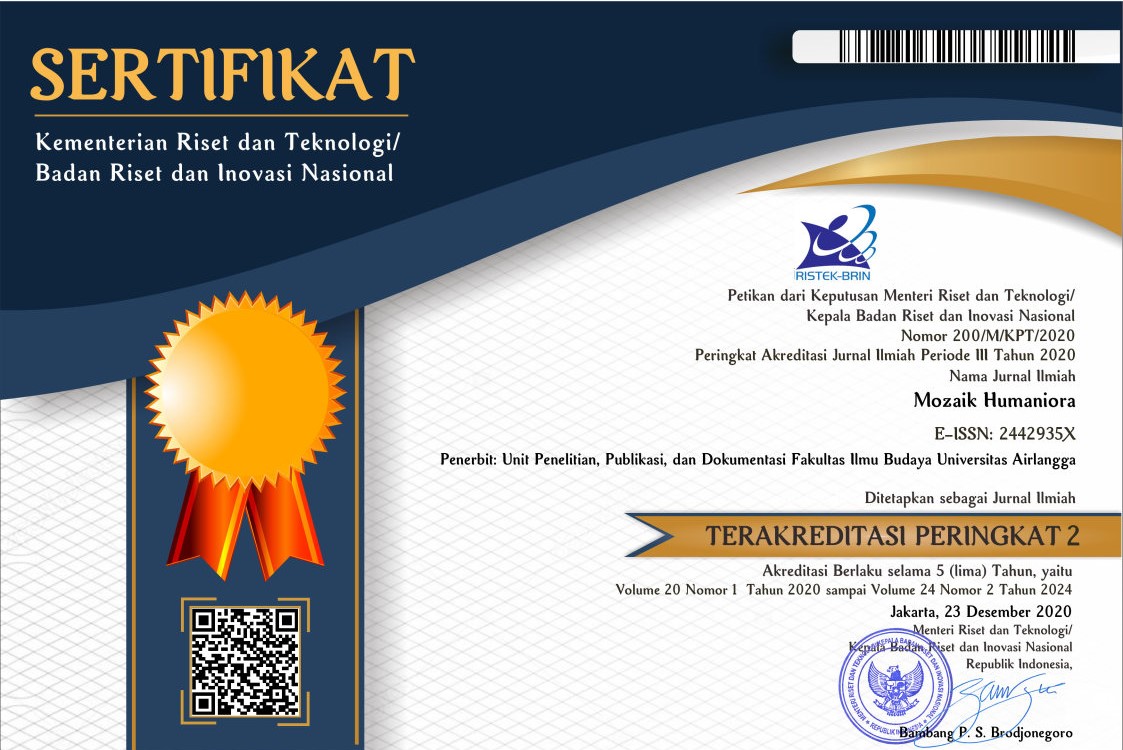Agrarian Culture and Javanese Attachment to Their Land: A Study of Local Wisdom Values in Javanese Proverbs
Downloads
Bryceson. (2002). "Multiplex Livelihoods in Rural Africa: Recasting the Terms and Conditions of Gainful Employment.” Journal of Modern African Studies, 40 (1):1-22.
Cassidy A. (2017). "The Farm as an Educative Tool in the Development of Place Attachments among Irish Farm Youth.” Discourse: Studies in the Cultural Politics of Education, 38(3):389-401.
Chirumamilla P. (2017). "Looking Back at the Land: Discourses of Agrarian Morality in Telugu Popular Cinema and Information Technology Labor”. Communication, Culture & Critique, 10:148-165.
Endraswara S. (2003). Metodologi Penelitian Kebudayaan. Yogyakarta: Gadjah Mada University Press.
Grubbstrom A, Eriksson C. (2018). "Retired Farmers and New Land Users: How Relations to land and People Influence Farmer's Land Transfer Decision.” Sociologia Ruralis, 58 (4):707-725.
Hintz C. (2015). "An Ecology of Love: Women Farmers, Sense of Place, the Georgic Ethic, and Ecocentricity”. Journal of Sustainability Education, 9:1-20.
Huddy AJ. (2016). Farming Alone: Factors Influencing Farmland Conversion Along the Rural Urban Fringe. Doctoral Dissertations. University of Connecticut Graduate School.
Ihromi. (2006). Pokok-Pokok Antropologi Budaya. Jakarta: Yayasan Obor Indonesia.
Junejo ZI. (2018). "Selected Agricultural Proverb and Sindhi Peasant's Indigenious Knowledge - A Source of Oral History.” Sejarah, 27 (2):83-94.
Kurien J. (1998). "Traditional Ecological Knowledge and Ecosystem Sustainability: New Meaning to Asian Coastal Proverbs”. Ecological Applications, 8(1):S2-S5.
Lombard D. (1996). Nusa Jawa Silang Budaya 3: Warisan Kerajaan-Kerjaan Konsentris. Jakarta: PT. Gramedia Pustaka Utama.
Martin JA. "The Agrarian Tradition Historical Perspective and Emerging Challenge”. Dalam Allison CB, Breimyer H HF, Lambert Wn, Leuthold FO, Martin JE, Seigenthaler J, Smith FE, Wheeler Wb. (1976). The Agrarian Tradition in American Society: A Focus on the People and the Land in an Era of Changing Values. Tennessee: A Bicentennial Forum the Institute of Agriculture the University of Tennessee Knoxville.
McAllister P. (1999). "Agriculture and Cooperative Labor in Shixini, Transkei, South Africa”. Grahamstown: Institute of Social and Economic Research and Leiden: African Studies ceter. Working paper, 40.
Naim M (2009). ‘Mochtar Naim: Sebuah Apresiasi Kritis'. Kata Sambutan untuk Naskah Buku 1000 Peribahasa Daerah tentang Tanah/Pertanahan. Dalam Sembiring J (2009). 1000 Peribahasa Daerag tentang Tanah/Pertanahan di Indonesia. Yogyakarta: STPN Press.
Nwaichi, EO. "Igbo Proverbs in Praise of Soil”. Advances in Literary Study, 7:21-31.
Ramin AT. (2019). "Cultural Values in Traditional Proverbs of Pakpak. in The Second Annual International Conference on Language and Literature”, KnE Social Sciences, 81-93.
Rieple A & Snijders S. (2018). "The Role of Emotions in the Choice to Adopt, or Resist, Innovations by Irish Dairy Farmers.” Journal of Business Research, 23-31.
Sarah H & Edward F. (2003). NonTraditional Agricultural Exports in Highland Guetemala” Understanding of Risk and Perceptions of Change, 3(82).
Sembiring J. (2009). 1000 Peribahasa Daerah tentang Tanah/Pertanahan di Indonesia. Yogyakarta: STPN Press.
Subroto (ed). (2001). Masyarakat Jawa Dalam Keseharian. Yogyakarta: Gadjah Mada University Press.
Syuaib MF. (2016). "Sustainable Agriculture in Indonesia: Facts and Challenges to Keep Growing in Harmony with Environment.” Agricultural Engineering International: CIGR Journal, 18 (2):170-184.
Tauchid, M. (2009). Masalah Agraria sebagai Masalah Penghidupan dan Kemakmuran Rakyat Indonesia. Yogyakarta: STPN Press.
Winangun, W. (2004). Tanah Sumber Nilai Hidup. Yogyakarta: Kanisius.
Xu G, Li y, Hay I, Zou X, Tu X, Wang B. (2019). "Beyond Place Attachment: Land Attachment of Resettled Farmers in Jiangsu China.” Sustainability,11 (420):1-12.
Zhao W. (2013). "A Comparative Study of the Deep Structure of Culture Reflected in English and Chinese Social Proverbs.” Journal of Language Teaching and Research, 4(2):392-400.

Mozaik Humaniora is licensed under a Creative Commons Attribution-ShareAlike 4.0 International License. Both authors and Mozaik Humaniora agree with the following attribution of journal:
1. Copyright of this journal is possession of Author, by the knowledge of the Editorial Board and Journal Manager, while the moral right of the publication belongs to the author.
2. The journal allows the author(s) to retain publishing rights without restrictions
3. The legal formal aspect of journal publication accessibility refers to Creative Commons Attribution Share-Alike (CC BY-SA).
4. The Creative Commons Attribution Share-Alike (CC BY-SA) license allows re-distribution and re-use of a licensed work on the conditions that the creator is appropriately credited and that any derivative work is made available under "the same, similar or a compatible license”. Other than the conditions mentioned above, the editorial board is not responsible for copyright violation.


















